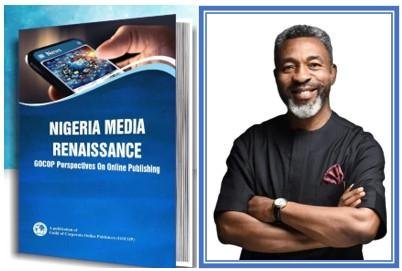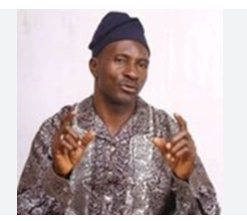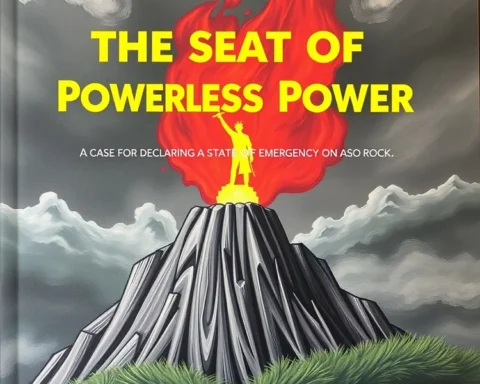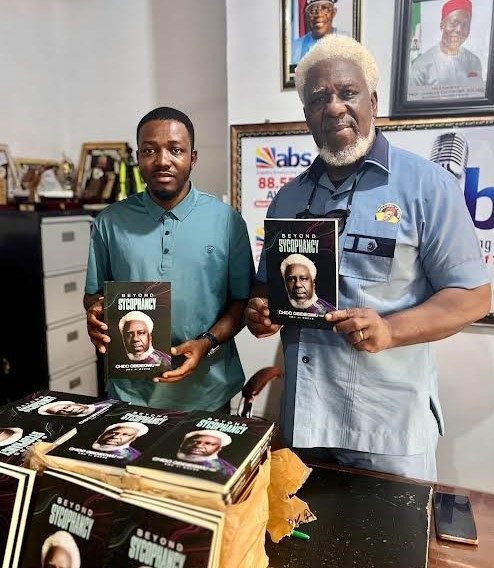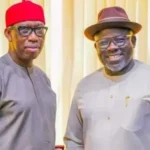I will start this review from the very title of the book – NIGERIA MEDIA RENAISSANCE GOCOP: Perspectives on Online Publishing. The title arrests attention and almost stirs a controversy at the first impression. How could a 10 years old child claim fatherhood! Not until you look further that you spot the two distinctions to the ‘Renaissance’ – GOCOP Perspective and Online Publishing Perspective.
Next are the list of 6 Editors and 16 and 1/2 Committee Members. A combination of the two shows that at least 22 and 1/2 persons midwifed the birth of this publication (although some played dual roles in editorial and operational capacities).
As the reader proceeds to acknowledgements, we see that more hands were involved, covering and factoring the diverse social and cultural miens of the country to give the book a broader, wider, and deeper perspectives. That’s not all. The reader discovers the shades of contributors, led by living online ‘archivals’ like Tom Chiahemen, the ‘funky malams’ like Danlami Nmodu, the ‘resilients’ like Ken Ugbechie, the ‘vibrants’ like Jessica Uwadaze, and the other lineup of stars that contributed to the book.
Who could have been more suitable to write the Forward than the choice of an online ancestor, Dapo Olurunyomi, OON, who presented the historiography of Online publishing, from Post Express in Lagos in 1996, to the diaspora component led by Elendureports.com in 2004, TimesofNigeria.com in 2005, and Saharareporters.com in 2006. His depth of knowledge and skill of rendition give very exciting and acclimatising insights.

This brings me to the concepts of perception and perspective, which the GOCOP President, Maureen Chigbo alluded in her introduction to the book. From the assertions of Canadian Communication theorist, Marshal McLuhan, that ‘the world is a global village’ and his dictum of the ‘medium is the message’, to Yves Decat’s quote that “… in communication, the perception is even more important than the message itself. That is why you have to put some effort into your message, so that perception won’t undermine your message…”. This is very important today! As we face the increasing challenge of misinformation and disinformation, we must carefully consider and chew our words carefully before releasing them. Decat’s quote captures the motivation of GOCOP’s to document the illustrious individuals and corporate bodies that have shaped online journalism in Nigeria, in remarkable ways that is worth writing on.
I cannot but agree with the president when she notes that the essence of this book, Nigeria Media Renaissance GOCOP Perspectives on Online Publishing, is to provide pertinent backgrounds on the evolution and frontiers of online journalism in Nigeria. There is no doubt that GOCOP has done remarkable things that deserve the monuments that are being preserved in the book we are presenting in its honour today.
From my perspective, the book brings out seven core elements:
It is an evidence-based hagiography of online publishing in Nigeria;
It underscores the pioneering efforts of online journalists who have made indelible mark on the sand of time;
It chronicles the development of online journalism from the perspectives of the industry players and stakeholders;
It provides a ringside account of high-wired politicking that characterises public institutions and tends to undermine their independence and autonomy;
It highlights the far-reaching implication of such political interference on the activities of Nigeria public institutions;
It provides a clear understanding of what online publishing is, and enables readers to understand its distinction with social media platforms; and
It underscores the quality of publishers involved in Online news publishing, most of whom are known to have served excellently and retired from top positions in journalism.
Henry Rollins noted, “I think it’s important to have some documentation of the past;” and Wietse Venema concurred that, “Lack of documentation is becoming a problem for acceptance”. We must therefore thank GOCOP, for giving us this veritable source of undiluted information about the evolution of online journalism in the country. In the same token, this book, I believe, is one of the effective ways by which GOCOP can demonstrate its commitment not only to online journalism scholarship but also to national development, while acknowledging the remarkable contributions of individuals and corporate entities that shape its emergence, birth, re-birth, growth, and development.
From another perspective, I perceive this book as an inspiring and deserving praise to veteran journalists turned mediapreneurs who had toiled for the promotion of press freedom and the rights of the citizens; and it is, indeed, an encouragement for motivating virtue and strong determination against adversity. The book is, certainly, a good account of the online publishers’ commitment to uphold professionalism and ethical values, and a deserving legacy of great example of having strong conviction in achieving a common objective deemed beneficial to journalism. Undoubtedly, the book is a celebration of the ‘aspirations of the pioneer engineers of this veritable platform’ for their sacrifices, discipline, and resilience, as well as GOCOP’s support for the present and aspiring online publishers.
It was Aristotle that asserted that truth is to say ‘what is that it is and what is not that it is not’, and false is to say ‘what is that is not, or what is not that it is’. This book is what GOCOP is! Like a mirror, individual displays their image through behaviour. This book, therefore, is a reflection of true image of GOCOP and its members.
As Dapo Olorunyomi asserts in the foreword of the book, the mission of the GOCOP since its establishment in 2013 was to ‘to uphold journalistic standards and sanitise online publishing in Nigeria.’ The extent to which the mission is being upheld is clearly manifested as observed by one of the contributors in Chapter 2, Page 34, ‘It is with pride that we say from the [Disciplinary] Committee that we have had only a few cases to treat because the foundation of and for GOCOP was firmly laid as an association of professionals.’ As Max Amuchie asserts in Chapter 11, all the contributors in this book, by their accounts, note salient impact of GOCOP in upholding ethical standards while fostering mediatised conversations on national issues
Now to the body! Nigeria Media Renaissance GOCOP Perspectives on Online Publishing, contains 11 chapters and an epilogue that report, explain, criticise and suggest formation, the early struggles and the role different stakeholders as online publishing evolves in the country. The triumphant existence of GOCOP, as chronicled in this book, would better be appreciated only if I share with you a summary of salient points raised therein. So, permit me to quickly present a summary of how the contributors present evolution of online publishing through GOCOP perspectives.
Segun Adeleye, in the first chapter on ‘THE BIRTH OF GOCOP’, provides details of GOCOP formation, the promoters, foundation members, and challenges encountered in name registration with the Corporate Affairs Commission in which more than five names were rejected as a substitute for Nigeria Online Publishers Association (NOPA), following the Commission’s claim ‘that NOPA was registered in error’ (p. 5), and the demand for indemnity payment of 65,000 Pounds by a supposedly sister organisation for identical name registration infringement. It is delightful to note that the promoters demonstrated resilience to sit through the painful pangs of rebirth that resulted from NOPA to GOCOP.
Chapter Two rolls out with a captivating declaration entitled, ‘GOCOP, A PACT WITH ETHICS’, which x-rays the role of the Guild’s ‘Disciplinary Committee/OMBUDSMAN in upholding professional ethics and integrity of the group. As stated earlier that the Committee had only treated a few cases, the nature of cases, lessons learnt from those cases as well as reasons for this remarkable achievement are well espoused in the chapter. This underscores the essence of the group in advocating and upholding members to the highest professional and moral standards.
Chapter Three entitled ‘SOCIAL MEDIA IS NOT ONLINE PUBLISHING’ reignites the debate on the amorphous relationship between social media and online journalism; further raising critical questions on the complexity of ‘sanitising the social media space’ from all forms of abuses. The chapter is very succinct in showing that monkey is not baby chimpanzee!
Online media as platforms used for strategic and corporate communication, publishers are expected to leverage on their partnership with advertisers for revenue as a business concern. Hence, Chapter Four entitled ‘GOCOP IN THE EYE OF PARTNERS’ showcases testimonials of a number top rated corporate entities that are partners of the group, attesting to the ingenuity of GOCOP as a front-row player in strategic communication while upholding publishing standards, professionalism and journalistic ethics.
Through in-depth interviews, online publishing and its impact on public communication in selected states, GOCOP highlights some case studies of its impact, including Delta, Kwara, Osun, Lagos and Kogi states. This is contained in chapters Five, Six, Seven, Eight and Nine, respectively. Specifically, Ken Ugbechie examines in Chapter Five how the management of Delta State’s owned newspaper, The Pointer, embraced and transformed into online Journalism to deliver reports on government activities while also fostering audience engagement.
In Chapter Six, Olumide Iyanda provides exposition on how the Kwara State Government adopted online media to ensure that its ‘messages resonate with both traditional audiences and the digitally native population’. Entitled, KWARA STATE: HARNESING ONLINE PUBLISHING FOR STRATEGIC COMMUNICATION, the chapter emphasises the critical role of the platform in promoting digital literacy and economy in the state.
In the same way, Akeem Oyetunji, in Chapter Seven entitled ‘OSUN STATE: PROMOTING DIGITAL ECONOMY THROUGH ONLINE PUBLISHING’ outlines how the state explored digital media to promote governance, digital economy, and literacy.
To reflect the critical role of sustaining audience engagement on governance in a populous and cosmopolitan state like Lagos, Gabriel Akinadewo in CHAPTER EIGHT ENTITLED ‘LAGOS STATE: IMPACT OF ONLINE PUBLISHING ON GOVERNANCE’ present analyses of various ways by which the state explored digital media for breaking ‘developmental stories’, ‘digitised learning in schools and improved digital learning’ as well as promoting ‘the state government’s activities to the international community’.
Written by Kingsley Femi Fanwo, Chapter Nine focuses on ‘KOGI STATE: PROMOTING STRATEGIC, ETHICAL STORYTELLING IN DIGITAL MEDIA SPACE’, to underscore the importance of media-government engagement through digital media, as well as the ‘growing relevance’ of the state in the national media conversation, emphasising the support of GOCOP for the launching and success of the ‘Invest in Kogi Campaign’.
As common to every emergent industry such as online publishing, there is an avalanche of skepticisms and ‘growth prospects’ which are well articulated in Chapter Ten of the book, entitled ‘THE FUTURE OF ONLINE PUBLISHING IN NIGERIA’. The Chapter, written by another veteran, Tom Chiahemen, highlights 13 challenges facing GOCOP, 3 expectations of GOCOP in the net 10 years, 3 expectations in the next 20 years, and 7 ways government can help in strengthening online publishing.
To further preserve the treasure trove of information contained in GUESTS’ SPEECHES THROUGH THE YEARS’, at GOCOP annual conferences, put together by Max Amuchie, Chapter Eleven highlights salient issues raised by prominent Nigerians on ‘economic diversification’, ‘security’, ‘elections’, ‘the COVID-19 pandemic’, ‘the digital economy’, and ‘socio-economic recovery’ at the GOCOP conferences between 2017 and 2024.
The foregoing enthralling perspectives on online publishing, with GOCOP as an emerging powerhouse for mediapreneurs run through all the 11 chapters in this book. I will like to reiterate the justification of Mr Olorunyomi for publishing the book, and I quote, ‘it provides a contemporary narrative of the profession, its principles, and the urgent role of online journalism. Its longitudinal and vertical depth offers both research value and a guide for the future’. He goes further, self-regulation underscores GOCOP commitment to uphold professional integrity through a peer-review process.
One of the great themes that resonate loudly across all the chapters in this book is GOCOP’s successful attempt made in the book to challenge the erroneous notion that digital space was left to charlatans and nonprofessionals at the early stage. The available evidence as presented in this book suggests otherwise. In addition, the book underscores the importance of self-regulation as a means of combating unethical practices among media profession. Another profound richness of the book is how it explores pertinent historical contexts on selected states in relation to the development of their digital communication and economy.
The pictorial work used to conclude the book also tells its own story.
I can confirm that this book, will definitely make every reader wish they could be like pioneering GOCOP members, whose sheer determination, strength of character and resourcefulness, gave birth to a very promising child, being nurtured to greatness. I must therefore, commend members of the Committee and various contributors of this book, who, by any standard, are all literarily dexterous. The way each of them presents their relational experiences with GOCOP is highly encouraging and progressive. This is no surprise as almost all of the writers or contributors are accomplished journalists, who decided to switch constituencies and help birth an exciting new dawn.
As inspiring as it is, as lucid as it is, in its smooth, simple but correct expressions, it has a few minor errors. These errors, include ‘the message is the message’ on page xvi, which I believe is meant to be ‘the medium is the message’. There are also sweeping statements and overgeneralisation as on pages 43-44, in which no scholastic evidence to support the contributor’s assertion that politicians ‘complain about the menace of social media, are even more guilty of abusing’. The use of ‘recent studies’ in Chapter Ten, page 88 was expected to be supported by an example of such studies on ‘shift towards online news consumption’. This becomes imperative for proper referencing.
Second, the book’s presentation of state of online publishing in Osun State was not detail enough. For instance, insights on the state’s policy on digital literacy was conspicuously missing. Third, there was an error of page layout in which appendix pages (A1-24) entitled ‘Photospeak of GOCOP Activities Over the Years’ was wrongly placed under Chapter Eleven which is meant for ‘Guests’ speeches through the Years’. A few pictures that appeared on pages A6, A18 and 20 are used without a cutline or caption.
Finally, reading a robust chapter on democracy would not have been a misplacement. As an industry, whose members, directly and indirectly, had paid the great price for democracy, it would have been wonderful to read GOCOP perspective on Nigeria’s democracy.
In this vein, online journalism has become a prominent platform of influence on national reputation. Accordingly, it would be strategic to examine and assess the impact of GOCOP in reputation management of the Federal Republic of Nigeria. This is one of the areas NIPR partners with GOCOP. It will indeed be great to read GOCOP’s perspective on this subject.
Notwithstanding, these errors and observations are very minor, and do not in any way affect the substance of the publication.
I will describe the book as a classic documentation of factual trajectory of a great destiny, whose time has come. With a powerful storytelling technique, ‘photo speak’, use of poetic devices as well as in-depth interview, readers will not want to put it down until they read the whole chapters and epilogue on behind-the-scene intrigues that played during GOCOP registration process with the CAC. The secret behind this irresistibility is the journalistic narration of events and contributions that are captivating about GOCOP transformation and its strategic influence on online journalism and digital economy.
Like I said at the outset, the book is a compendium of history and intrigues that provide a contemporary narrative on online publishing, detailing with contributions of different players on the media renaissance. As you read on, you will continue to admire the tenacity and foresights of the five ‘wise ones’ that conceived the idea of setting up a platform in which aspiring digital media owners can flourish.
Distinguished guests, the taste of the pudding is in the eating. I have tasted this pudding of the celebration and contribution of journalists-cum-mediapreneurs per excellence. It tastes well. It is far from praise-singing. I therefore recommend the book for all and sundry to provide us a theoretical and professional guide for us to have insights of front-row accounts of an emergent and flourishing online publishing ecosystem. Get copies and share with friends and loved ones.
Certainly, GOCOP is coming of age, which explains why it now needs its own befitting facility to house the ideas and operations, with a conducive environment to raise a credible successor generation to secure the future of this thriving industry – ‘the son of man now needs a place to lay his head’.
I will like to conclude by taking GOCOP members back to the caution of Dapo Olorunyomi in the beginning. In his words in the forward, he writes, “The lessons from history are clear: Freedom must never be taken for granted. To safeguard this freedom, the online journalism community must collaborate to strengthen ethical, fact-based journalism and resist the forces that seek to undermine it”
Your excellencies, distinguished ladies and gentlemen, please accept my thanks for the opportunity and God bless us all.
Dr. Ike Neliaku fnipr, is the President Nigerian Institute of Public Relations
